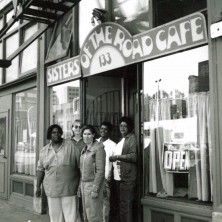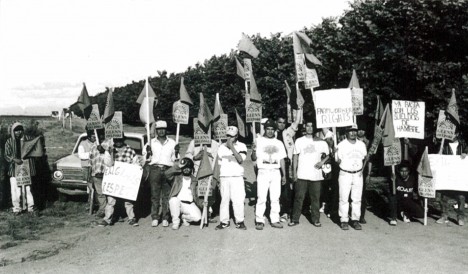It is undeniably risky to fund groups that don’t have a proven track record of success. Both individual donors and foundations work with a limited pool of resources and we all want to make the biggest impact we can with those resources. New and emerging groups often lack many of the indicators that signal impact: infrastructure, proven leadership, an organizing base, and financial stability, among others. This is why few foundations are interested in supporting emerging groups. But it’s also why MRG Foundation sees seed funding as so strategic.
MRG’s Seed Funding Strategy

Sisters of the Road Café in 1980
We believe that creating social change requires us to support innovative and sometimes unproven groups, which is why we’ve been the leading funder of cutting-edge social change work for nearly 40 years. Our seed funding supports emerging groups rooted in communities – and addressing issues – that don’t have access to more traditional sources of funding. These grants are long-term investments in innovative leaders, emerging issues, and new ideas that Oregon needs to tackle our biggest challenges.
Throughout MRG’s history, we’ve seen that small grants made when a new group is just getting off the ground can be the catalyst for a tremendous impact.
For example, in the 1970s, funding for survivors of domestic violence and women’s shelters was not part of the mainstream consciousness. MRG was an early funder for organizations like Bradley-Angle House in Portland, Womanspace in Eugene, and groups throughout Oregon working to empower women and prevent domestic violence.
In 1984, at a time when there were only 14 confirmed cases of AIDS in Oregon, MRG made an early grant to Cascade AIDS Project to educate the gay community and the general public about AIDS risk factors and safer sex practices.
In early 2003, we gave a seed grant to the Community Language and Culture Bank, supporting their work to push back against anti-Muslim sentiment and the drumbeat of war in Iraq. The Community Language and Culture Bank renamed the Center for Intercultural Organizing and is now a national model for cross-cultural organizing.
The Impact of Seed Funding
Grants to new and emerging groups represent some of MRG’s highest impact investments. Seed funding provides not only critical early support that groups need to catalyze their work, but it often builds momentum and external confidence. Few funders want to be first, so a grant from MRG increases the ability of groups to secure support from other foundations and individual donors. Not every emerging group turns into a movement leader, but MRG is proud to have been the first funder to some of the strongest and most influential social justice organizations in Oregon.


